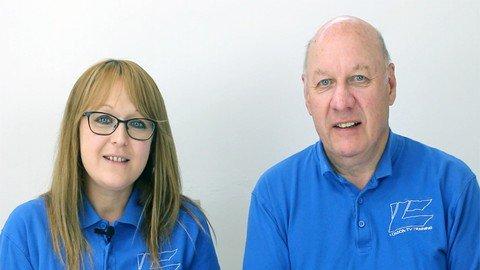Most Commented
Voice Over





Description material

Published 8/2023
MP4 | Video: h264, 1280x720 | Audio: AAC, 44.1 KHz
Language: English | Size: 5.03 GB | Duration: 4h 12m
Voice Over for Radio, Television, Audiobook, Podcast
What you'll learn
How the voice business works
What you may need to change in your own voice?
How to learn from experienced voice-overs and acquire their skills?
Insight on building your own home studio inexpensively
Where to find work?
Developing your versatility
Tips on reading fluently
Microphone technique
Making a read interesting
Expanding your "comfort zone"
Special skills for reading commercials
How to get clients and how to keep them?
Reading to time
Making a showreel
The different people and organisations that need voice-overs
How to deal with producers?
Requirements
No special requirements need to take this course. A willingness to learn and practice will take you a long way – we will show you how to do this. A good positive attitude is important and we'll show you how to use your spare time to practice and improve. Our courses are suitable if you want to learn new skills and upgrade your talents and you career. Learning to use your voice effectively will help you in any career and get you noticed and appreciated. It will also enhance your CV.
Description
If you think you have a voice that people keep complimenting then you may have the raw material to make a career in the world of voice-overs.Once you have applied yourself and learnt the skills of a voice-over you can walk into any studio and perform. You don't need any equipment to do this – just your voice – it's the ultimate portable skill.If you do want to work from your own studio at home we'll show you what you need.Like any other skill, for example juggling, you have to practice and apply yourself. This course will show you what you need to do to become proficient at voice-overs and find the niches for which your voice is best suited.In recent years, voices and accents of all kinds have become in demand, you no longer have sound like the honey voiced announcers of old. The use of voice-overs has grown exponentially with media of all kinds needing voice work for their productions, and this is your opportunity.All over the world English is the international language and there are many possibilities to supply those voice-overs yourself to producers abroad.You'll learn from experienced voice-overs on how they get work and producers on what they want and need from a voice. We'll show you how to improve your voice and make yourself more versatile. This course opens the door to a well paid profession you can even do from home.Tutors:Steve England, Radio Producer and Voice OverJulia Small, Radio Producer and Voice OverGuest speakers:- Chris Brookes, Screen Writer and Author- Rachel Knighting, Head of Production & Audio Producer at S2Blue- Tom Marshall, Producer and Voiceover Artist- Steve Jones, Director at Spoken-Image- Emma Davis, Producer and Voiceover Artist
Overview
Section 1: Voice Over - Module 1
Lecture 1 An overview of the business
Lecture 2 The changing requirements of the media
Lecture 3 Different types of voicing work
Lecture 4 Finding your strengths and weakness
Lecture 5 Overcoming shyness and embarrassment
Lecture 6 Challenges of breaking into the industry
Lecture 7 Meet Emma Davis - Producer and Voiceover Artist
Section 2: Voice Over - Module 2
Lecture 8 Recording and listening to your own voice
Lecture 9 Assessing areas you might be able to improve
Lecture 10 Common faults if you want to speak R.P. (Received Pronunciation)
Lecture 11 Finding your range
Lecture 12 How to figure out the techniques of the professionals?
Section 3: Voice Over - Module 3
Lecture 13 Studio equipment
Lecture 14 Microphones and Mic technique
Lecture 15 Studios and setting up your own home studio
Lecture 16 Connecting to producers
Lecture 17 Putting together a small inexpensive portable studio
Section 4: Voice Over - Module 4
Lecture 18 Voicing male & female
Lecture 19 Learning to voice to time
Lecture 20 How to alter your delivery for different parts of the busines?
Lecture 21 Natural Voicing
Lecture 22 Preparations for a session
Lecture 23 Interview with Rachel Knighting (Head of Production & Audio Producer at S2blue)
Section 5: Voice Over - Module 5
Lecture 24 Recording
Lecture 25 Outsourcing editing
Lecture 26 Processing
Lecture 27 Delivering finished files
Section 6: Voice Over - Module 6
Lecture 28 Talking Books: a new opportunity
Lecture 29 What authors want and dealing with difficult ones - Plus Chris Brookes' tips
Lecture 30 Platforms to audition on
Lecture 31 Technical requirements - Plus Chris Brookes' tips
Lecture 32 How long does it take to read a book?
Lecture 33 Different deals with authors
Section 7: Voice Over - Module 7
Lecture 34 Making showreels - Plus interview with Tom Marshall (Voiceover Artist)
Lecture 35 How to market yourself? Plus interview with Tom Marshall
Lecture 36 How to approach producers?
Lecture 37 Running your voicing like a proper business - Plus interview with Tom Marshall
Lecture 38 Voices on demand - Plus interview with Tom Marshall
Section 8: Voice Over - Module 8
Lecture 39 How to get experience?
Lecture 40 Different audition platforms
Lecture 41 What to say about yourself?
Lecture 42 Clients to watch out for and those to treasure with Tom Marshall
Lecture 43 Building relationships with producers and clients
Lecture 44 What to charge? - Plus interview with Tom Marshall
Lecture 45 Invoicing and billing - Plus interview with Tom Marshall
Section 9: Voice Over - Module 9
Lecture 46 Advertising agency sessions
Lecture 47 Preparing for a session
Lecture 48 Marking up the script
Lecture 49 Dealing with clients
Lecture 50 Dealing with producers - Plus interview with Steve Jones
Lecture 51 Remakes
Lecture 52 Demo reads
Lecture 53 Producing yourself
All voice over enthusiasts. If you think have a voice that people keep complimenting then you may have the raw material to make a career in the world voice-overs.
Buy Premium Account From My Download Links & Get Fastest Speed.
https://1dl.net/fy8y3hfz1te2/Voice_Over.part1.rar
https://1dl.net/xd54dytpv94b/Voice_Over.part2.rar
https://1dl.net/nsnn69wjhos7/Voice_Over.part3.rar
https://1dl.net/8dpgb9kb0k1e/Voice_Over.part4.rar
https://1dl.net/xhaze9euhvkk/Voice_Over.part5.rar
https://1dl.net/baboocrkl582/Voice_Over.part6.rar
https://rapidgator.net/file/fb91bfdc230eb024e0f9e1c10b8c5c68/Voice_Over.part1.rar.html
https://rapidgator.net/file/eaca95a937dffe495937ff1b40f0969e/Voice_Over.part2.rar.html
https://rapidgator.net/file/53b944dac74b81300df32c802b44893e/Voice_Over.part3.rar.html
https://rapidgator.net/file/316bd950128f4ce99ab05f7555682241/Voice_Over.part4.rar.html
https://rapidgator.net/file/7eac827e1ae9dbea68c134da4840fc61/Voice_Over.part5.rar.html
https://rapidgator.net/file/fb30e1d6a525dd95d8ff0bc40f1b7feb/Voice_Over.part6.rar.html

Join to our telegram Group
Information
Users of Guests are not allowed to comment this publication.
Users of Guests are not allowed to comment this publication.
Choose Site Language
Recommended news
Commented


![eM Client Pro 9.2.1735 Multilingual [Updated]](https://pikky.net/medium/wXgc.png)






![Movavi Video Editor 24.0.2.0 Multilingual [ Updated]](https://pikky.net/medium/qhrc.png)

